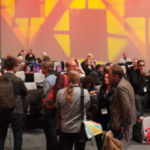
Last year, Washington, D.C.–based global incubator and seed fund 1776 organized its first Challenge Festival — a week-long event that capped off 1776’s Challenge Cup competition for potentially transformative startups, which itself had spanned six months and 16 cities around the world.
It wasn’t enough. For Challenge Festival 2015, held in D.C. on May 8–16 and attended by more than 10,000 people, 1776 broadened and deepened the program by introducing Industry Days — four days of programming clustered around specific areas in which 1776 is interested in facilitating innovation: education, energy and sustainability, health, and transportation and cities. “We’re big believers that nothing should happen in a vacuum,” said Donna Harris, 1776’s CEO and co-founder. “Many of the topics that we focused on during [Industry Day] panels are the same issues that our entrepreneurs [competing in the Challenge Cup] are facing in the daily quest to scale their companies.”
Convene attended the Education Day program at the Shakespeare Theatre Company’s Lansburgh Theatre. Like the entire Challenge Festival, the program involved players from every sector, including government officials, teachers, education administrators, and entrepreneurs. Jessica Rosenworcel, a Federal Communications Commission commissioner, delivered the morning keynote, focusing on the “broadband gap” that is leaving schoolchildren without a fast Internet connection at a disadvantage.
Rosenworcel was followed by a session on “The Maturing Evolution of the K-12 Startup Innovator” for which the moderator — Mary Jo Madda, associate editor for the education-technology website edSurge — banned panelists from using buzzwords such as “disruption” and “innovation.” The next session, “The Rise of the Mobile, Modern Trade School,” included panelist Jake Schwartz, who put in a plug for face-to-face experiences. “We’ve had remote, self-directed learning for 500 years now,” Schwartz, CEO and co-founder of General Assembly — an education organization that offers classes in web development, business, and other fields at campuses in 13 cities worldwide — told the Challenge Festival audience. “It was called a printing press. It still didn’t preclude people from getting together in universities and classrooms.”
Each Industry Day ended with 20 startups working in that day’s area of focus competing for two $50,000 prizes and two semifinalist slots in the Challenge Cup finals. The “Elite Eight” finalists went head-to-head late in the afternoon of the last day of Challenge Festival. And the champion and winner of a $150,000 investment from the 1776 Seed Fund? Nairobi, Kenya–headquartered Twiga Foods, a mobile-based distribution platform that’s working to plug gaps in the supply chain connecting produce vendors in Africa.
“Challenge Festival convenes people with the best ideas to create global impact in the industries that impact our everyday lives,” Harris told Convene. “We think that the value of Industry Days came from the opportunities for the 80 Challenge Cup competitors to learn from and meet with leaders in their field, and vice versa.”



